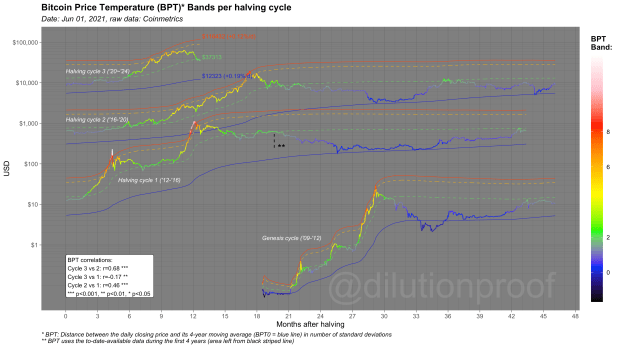Bitcoin Is Venice: Capitalism Without Capitalists
Bitcoiners neither attack nor defend capitalism, but question its premises and do their best to clarify the system we’re currently living in.

This article is part of a series of adapted excerpts from “Bitcoin Is Venice” by Allen Farrington and Sacha Meyers, which is available for purchase on Bitcoin Magazine’s store now.
You can find the other articles in the series here.
If we had to pick a moment in time in which we entered the final stages of degenerate fiat “capitalism,” we would likely pick March 2020, when it seemed very much as if the everything bubble had popped.
In the end, price-to-earnings (P/E) ratios didn’t implode under their own stupendous highs, nor did the conceptual insanity of negative rates trigger bank runs. The euro didn’t fall apart (yet) and there was no hyperinflation (yet). It was an “exogenous shock” wot done it, and it was magicking one quarter of all money in existence out of thin air wot staved off a catastrophe since made all the more inevitable.
We encourage readers to read the phrase, “exogenous shock,” with maximal eye-rolling sass and to recall when we discuss the kind of nonsensical economic theorizing that got us into that mess, which works perfectly well in every conceivable circumstance other than contact with the real world.
This put us in a tragicomic position. In order to deal with this “exogeny,” we seemingly had to go into overdrive on the exact same measures that made us vulnerable in the first place: We needed to print money like there was no tomorrow and throw it at everything that moves. That was literally the plan. That’s how we deal with emergencies now.
This extract is about the bizarre reaction we noticed from a solid majority of the professional commentariat to the effect that this is the inevitable result of capitalism run wild. We are not sure what these people mean, or even think they mean, by “capitalism.” If they mean, “the regime of political economy dominant in the West since 1971 and particularly acute since 2009,” then they are correct on a technicality, but they are abusing the word.
If “capitalism” means anything, that meaning ought to at least include the notion of preserving and growing capital. It can include other nasty bits and bobs, for sure, but it must at least include this. We are mindful of Eli Heckscher’s concluding remarks in “A Plea For Theory In Economic History”:
“A special warning, I think, it necessary against the promiscuous use of the concept of ‘capitalism’ — das Wort das sich immer zur rechten zeit einstellt, wo volkwirtschaftliche Begriffe fehlen [the word that always comes in at the right time, where economic terms are missing], to adapt a famous phrase from the Faust of Goethe. By this it is, of course, not intended to infer that some rational and distinct meaning cannot be expressed through the word ‘capitalism,’ but simply that it is far too often made an excuse for muddled thinking.”
The aim of “Bitcoin Is Venice” and this series could well be concisely captured as providing such a rational and distinct meaning and analyzing how the concept so captured is affected by the emergence of Bitcoin.
But before we get to global, digital, sound, free, open-source, programmable money, we will build our theoretical foundation around this effort precisely because such a rational and distinct meaning seems very much absent from the public discourse. In particular, the preservation and growth of capital is not happening, nor has it happened since before the dominance of the regime now misleadingly bearing this name. Reflecting on how this regime came about, Andrew Redleaf and Richard Vigilante write in “Panic: The Betrayal Of Capitalism By Wall Street And Washington”:
“The ideology of modern finance replaced the capitalist’s appreciation for free markets as a context for human creativity with the worship of efficient markets as substitutes for that creativity. The result was a divorce of entrepreneurial knowledge from economic power.”
George Gilder comments similarly on this phenomenon in “Knowledge And Power,” arguing that the Great Financial Crisis, “has a clear and identifiable cause. That cause is a prevailing set of economic ideas that can be summed up as capitalism without capitalists — capitalism dominated by financial hypertrophy rather than technological vision and innovation.”
It is somewhat concerning to us that people seemed, and still seem, to be lining up to both defend and attack “capitalism,” when the object of discussion could hardly be further from any worthwhile meaning of the word but is rather better described as: To boost aimless consumption, primarily with uncollateralized debt, by destroying the price signals for capital and depleting its stock.
We humbly suggest the following schema for categorizing both the attacks and defenses. To borrow an expression from James C. Scott’s “Seeing Like A State” that we use throughout “Bitcoin Is Venice: and this series, the attackers tend to be “high modernists,” concerned with aesthetic knowledge and emotional persuasion: They dislike what they think capitalism is because it feels wrong, and they want to redesign it from the top down. Scott introduces “high modernism” as follows:
“It is best conceived of as a strong, one might even say muscle-bound, version of the self-confidence about scientific and technical progress, the expansion of production, the growing satisfaction of human needs, the mastery of nature (including human nature), and, above all, the rational design of social order commensurate with the scientific understanding of natural laws. It originated, of course, in the West, as a by-product of unprecedented progress in science and industry.
“High modernism must not be confused with scientific practice. It was fundamentally, as the term ‘ideology’ implies, a faith that borrowed, as it were, the legitimacy of science and technology. It was, accordingly, uncritical, unskeptical, and thus unscientifically optimistic about the possibilities for the comprehensive planning of human settlement and production. The carriers of high modernism tended to see rational order in remarkably visual aesthetic terms. For them, an efficient, rationally organized city, village, or farm, was a city that looked regimented and orderly in a geometrical sense…
“High modernism was about ‘interests’ as well as faith. Its carriers, even when they were capitalist entrepreneurs, required state action to realize their plans.”
Those who attack “capitalism” unfortunately tend to be exceptionally high modernist. They undoubtedly require state action to realize their plans and, in many cases, this is what they are openly agitating for. And they are partly right: Degenerate fiat “capitalism” is wrong. Yet while their diagnosis might be sound, their prescription would do nothing for the disease and would kill the patient besides.
The defenders are degenerate fiat financiers, concerned with codified knowledge and authoritative persuasion. They are in no way right: They are the most inadvertently inhumane and destructive people alive — one is tempted to say they are evil in the Arendtian sense of the banality of their inhumanity and destruction. They mindlessly repeat the exact dogma that has caused all the problems to date, and in the course of lobbying for more power to fix the problems their power has caused.
We, on the other hand, and Bitcoiners in general, neither attack nor defend “capitalism” — in scare quotes so as to distinguish degenerate fiat “capitalism” from actual capitalism — but rather question the premises and do our best to clarify what we are talking about in the first place. We are concerned with practical knowledge and logical persuasion. We value experimentation, such that it might lead us to discover some sliver of informational signal that can, in principle, be independently verified, provided the dynamic process being analyzed has not changed too much in the meantime, although it probably has. But this is all far too sensible for so early in the series. We will get to this in due course.
This is your brain on central banking, regulatory capture and financialization. This is not capitalism.
This is a guest post by Allen Farrington and Sacha Meyers. Opinions expressed are entirely their own and do not necessarily reflect those of BTC Inc or Bitcoin Magazine.









